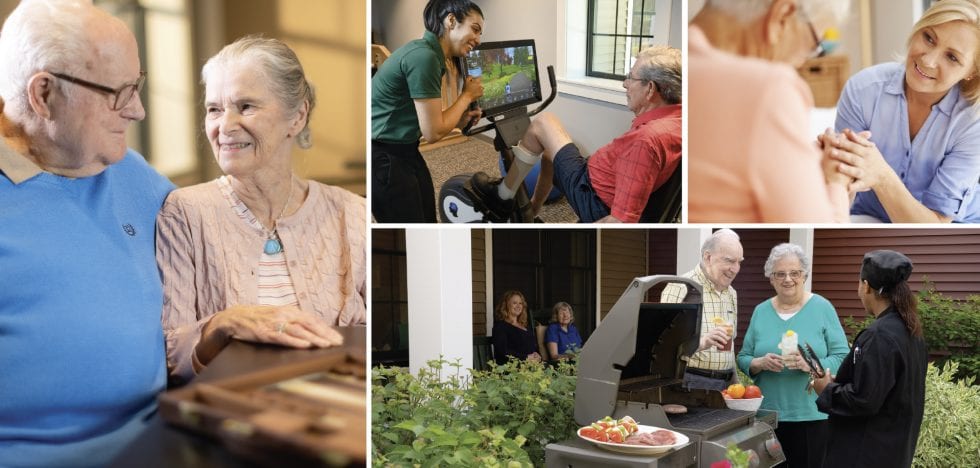Choosing to move a parent or spouse to an assisted living or memory support community is a difficult decision that many people will face at some point. And while you may understand that it’s the right choice, you can still experience feelings of guilt, grief, and even anger. Following are some common thoughts we hear from family members, and counterpoints that can help you make peace with your decision.
“I should be the caregiver” or “I should be able to handle this on my own.”
At some point in life, many of us make a spoken or unspoken promise to take care of our parents — and we assume we’ll always be with our spouses. And while it’s a commitment that comes from deep in our hearts, there’s no way to know what the future holds. Until you have experienced the challenges that come with aging — or caring for an aging parent or spouse with health concerns or dementia — you have no way to know how involved their care may become. It’s OK to acknowledge that your original plans may have been unrealistic, and the care your loved one requires is more than you can handle on your own. And it’s important to remember that taking the best care of them may mean finding a place where they’ll receive the compassionate, professional care and assistance they need.
“I’ve failed my parent/spouse.”
Choosing assisted living or memory support for a parent or spouse who needs care is a loving, proactive decision. It’s a choice to ensure they get the care they need from trained professionals in a safe, secure environment. You have not failed; you’ve made the decision you think is in their best interest and one that will help them realize their highest potential for independence, autonomy and social engagement. In fact, most people thrive in The Woodlands Inn’s engaging, small-home environment where they can move about freely, interact with their peers and choose how they spend their days.
“I feel like I’ve abandoned my parent/spouse.”
Far from abandoning them, you will both enjoy the opportunity to renew your relationship as you return to your role as a daughter/son or loving spouse rather than a caregiver. Many people find this transition to be fulfilling for everyone as the time you spend together becomes more social and familial rather than task-oriented or focused on caregiving. Plus, you’ll be able to spend as much quality time with your loved one as you choose.
It’s also important to remember that even though professionals will take over the day-to-day caregiving, you’ll still have an important role to play as part of the care team. When your parent or spouse moves into The Woodlands Inn, our Innkeepers will look to you to help us learn about your loved one’s history, interests and preferences. Your input will help us create a personalized care plan, activities and even meals to ensure they feel happy, secure, and engaged in their new home.
“I feel relieved. And that makes me feel guilty.”
If you’ve been the caregiver for a parent or spouse, you’ve probably sacrificed your own self-care and put some of your own plans and goals on hold. So, it’s only natural that you’ll feel a sense of relief when that burden is taken off your shoulders. It’s also natural to feel guilty about it. But remember — the parents and spouse who love you don’t want to be a burden. If they understand the toll caregiving has taken on you, they’ll likely feel a sense of relief as well.
Most of all, remember that conflicting emotions are natural and are a result of the fact that you care so much. Give yourself and your loved one time to adjust to this new way of life. Tune out judgement or negative comments from those who have not walked in your shoes. Look for the small victories — something that made your parent or spouse happy in their new home, something you had time to do for yourself — and write them down in a journal to look back on. If it helps, talk with someone you trust — a friend, family member, spiritual leader or counselor — who understands your situation and can help you process your feelings.
One final note: Try not to second-guess your decision. If you notice a physical or cognitive decline in your parent or spouse, you may be tempted to think it’s a result of the move and blame yourself. But it’s important to remember that the physical and cognitive changes that come with aging are progressive and would have occurred even if you had kept them at home. On the other hand, if you see your loved one thriving at The Woodlands Inn, you may think it means you didn’t provide good care at home. In that case, remind yourself you did the very best you could for them — including finding compassionate, professional care and the most innovative, engaging, home-like environment available. Then, give yourself some credit.
The best time to choose an assisted living or memory support community is before a crisis forces you to make a decision. We invite you to take a personal tour of The Woodlands Inn and learn about our innovative, small-home assisted living and memory support households. We’re here to answer all your questions and help you make a decision you’ll feel good about. To schedule a personal tour, call 978-738-6104.

